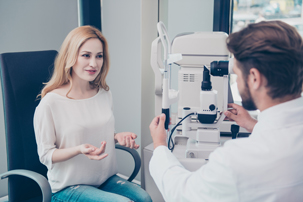
What questions do patients usually ask when they make an appointment for a preliminary qualifying examination for a laser vision correction procedure and during the examination itself? |
| 02.07.2020 |
 Laser vision correction means a new life – a life completely free from a refractive error. Year on year further people consider this quick and safe way of having their vision defect permanently corrected. Yet before the final decision to undergo the surgery is made, a number of questions arise…
Laser vision correction means a new life – a life completely free from a refractive error. Year on year further people consider this quick and safe way of having their vision defect permanently corrected. Yet before the final decision to undergo the surgery is made, a number of questions arise…
Laser vision correction is generally considered a safe procedure although complications cannot be totally ruled out. However, complications occur very rarely, affecting as few as less than 0,1% of operated patients, and are fully curable. The risk of complications is much smaller when we follow the doctor’s recommendations, both those during the procedure itself and the ones regarding the post-surgical convalescence period. What is more, the doctor may disqualify a patient from the surgery if their medical history or tests reveal any contraindications.
The surgery is absolutely painless as it is conducted under local anaesthesia administered in the form of eye drops. Before the surgery begins painkiller eye drops are applied into the operated eye(s). Additionally, every patient is administered oral painkillers. The procedure may be conducted using various methods. After an SBK LASIK surgery the convalescence period is quick and painless. Following a LASEK and TransPRK surgeries pain is experienced during the first two days afterwards, therefore it is advised to take painkillers then.
Each method is effective, but the decision which one to choose is determined by the severity of the vision defect, individual eye structure and the shape and thickness of the cornea. During the preliminary qualifying examination the doctor discusses the surgery method with the patient. If all methods are equally suitable for the patient, they choose the method themselves on the basis of the doctor’s explanation.
Refractive regression will not occur if the error has been stable for at least one year prior to the surgery and if the rules listed below are followed. The eye drops which the patient receives after the procedure (antibiotic, steroid, moisturising drops) positively affect the results of the convalescence period. Proper administration of the eye drops contributes to the achievement of optimal effect of visual acuity. Obeying the rules of work hygiene and following the operating doctor’s recommendations minimise the risk of error regression. Taking proper breaks from any visual effort and spending sufficient amount of time outdoors are conducive to the alleviation of accommodative tension – one of the reasons for short-sightedness progression. The cornea incepts oxygen and nutrients from the air and from our tears when we blink. There are ciliary muscles in the eyes, which are responsible for lens accommodation. Both the ciliary muscles and the oculomotor muscles around the eyes need movement as well as rest.
Yes, it can. If during a preliminary qualifying examination the doctor does not find any contraindications, such as a big difference between vision defects in both eyes, a bilateral procedure can be performed.
Yes, it is. Both errors may be corrected during one procedure. If astigmatism is accompanied by far-sightedness instead of short-sightedness a correction of both errors at the same time is also possible.
The surgery itself lasts approximately 15 minutes, but the time needed for the procedure together with the preparation and the resting period takes about an hour. It only takes less than twenty seconds for the laser to operate on one eye, with the exact time determined by the error severity. The return to everyday activities following the surgery is possible as soon as the day or sometimes two or three days afterwards, depending on the correction method chosen for the surgery.
Everything depends on the type of your job and the correction method chosen for the procedure. After an SBK LASIK surgery it is possible to return to work even on the next day. In case of other methods it is recommended to refrain from working for at least a week after the procedure. However, if our job involves great physical effort or staying in a dusty environment, a longer sick leave or holiday leave is worth considering.
For about one month after the laser procedure it is recommended to avoid intensive physical effort (working out in the gym, weightlifting) as it may lead to increased intraocular pressure. Contact sports extreme sports or sports in which the eyes are exposed to injury should not be practised earlier than two months after the surgery and even then it should be first consulted with your doctor. Mild, aerodynamic exercises, such a as aerobics or jogging are allowed a week after the surgery.
During the preliminary qualifying examination you should inform the doctor about the needs you have in terms of your eyesight, the type of job you do, sports you practice, your hobbies and your lifestyle. Such information will enable the doctor to decide whether you are a good candidate for laser vision correction and to choose the most suitable correction method for you.
Do you have any questions? Use a special form under the ASK THE DOCTOR tab or fill in the ONLINE preliminary qualification form and find out whether laser vision correction is suitable for you.